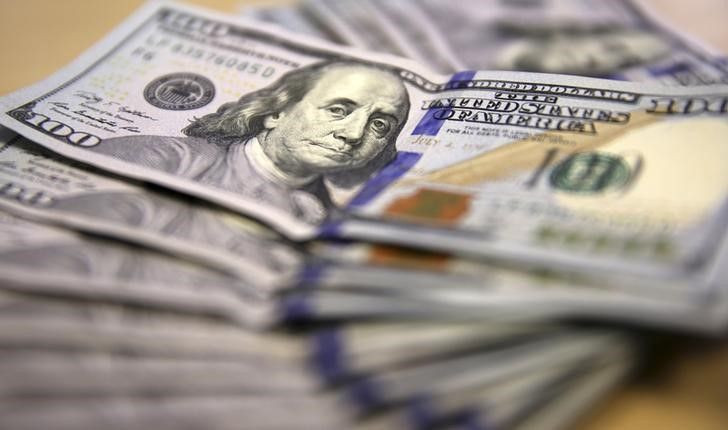PepsiCo Inc, The Coca-Cola Co Warn Of Currency Issues: Why A Strong Dollar Is Taking The Fizz Out Of US Companies

The Coca-Cola Co. warned this week that a strong U.S. dollar will weaken the value of its overseas sales in 2015. CEO Muhtar Kent said 2015 will be a “transition” year for the world’s largest beverage maker as fluctuations in currency-exchange rates are expected to cut net revenue by 5 percent and shave pretax profit by 7-8 percent.
Meanwhile, rival PepsiCo Inc. said Wednesday its fourth-quarter profit was also hurt by currency-exchange rates. The company warned it expects foreign exchange to weigh on revenue and earnings by 7 percentage points in 2015.
Coca-Cola and PepsiCo aren’t alone. The major theme this earnings season is just how much a strengthening dollar is affecting the revenue and profits of U.S. multinationals. The potent dollar is a huge drag on growth for the benchmark S&P 500 because the index’s companies are believed to derive almost one-half of their revenue overseas.
As the U.S. economy steadily improves -- and Europe and Asia continue to slow down -- the value of the U.S. dollar continues to advance against major currencies. The greenback has gained more than 15 percent against the euro and the Japanese yen in the past six months. It hit an 11-year high against the euro Jan. 16, after the Swiss National Bank’s decision to scrap its three-year-old cap on the franc.
With 317 S&P 500 companies reporting before Monday, the earnings season for the final three months of 2014 is just past the halfway mark. So far, the fourth quarter’s financial results have revealed U.S. companies are not immune to global weakness. Nearly 20 percent of companies in the index have mentioned the negative impact of a stronger dollar, according to research firm Estimize.
“The U.S. economy is much more self-sufficient that the eurozone or Japan, but it still has a fifth of its activity in trade overseas, and as the U.S. dollar strengthens, that has effects not only on exports and growth, but also on earnings, as we’ve seen this quarter,” said David R. Heidel Jr., regional investment director at U.S. Bank Wealth Management.
A prolonged period of dollar strengthening hurts U.S. multinational corporations when they convert foreign revenue to dollars, thereby slowing earnings growth. Some companies will feel the pain more than others. Almost 83 percent of the Intel Corp.’s sales, for instance, come from overseas, while Qualcomm Inc.’s international sales account for 97 percent of its annual revenue.
In their communications with investors and analysts, executives have been voicing concerns about the dollar’s muscle -- at the multinational giant General Electric Co., power-management-solutions company Eaton Corp. PLC and global manufacturing firm ITT Corp.
“The dollar has certainly been a prominent theme this earnings season. In the consumer space, those that are more domestic oriented have certainly fared better from a performance standpoint,” said Eric Wiegand, senior portfolio manager at U.S. Bank Wealth Management.
Google Inc. disappointed investors after the tech giant missed expectations on earnings and revenue due to the headwind the company faces from a strong U.S. dollar. “Overall, if you look at the technology sector where international exposure is greater than any of the other nine S&P 500 sectors, it’s definitely affecting large technology companies more than any other group,” said Angelo Zino, an analyst at S&P Capital IQ.
On the hardware side, the Hewlett-Packard Co. is heavily exposed in Europe. “It’s a lot more expensive now for a consumer to buy a HP ... personal computer in Europe than it was just three months ago. It’ll be interesting to see how that impacts trends here in the next 6 months to a year,” Zino said.
Meanwhile, the McDonald’s Corp. issued dismal global numbers Monday that showed the company’s same-store sales shrank 1.8 percent last month, worse than analysts had forecast. During 2014, McDonald’s experienced significant declines in company operating margins in Europe and Asia driven by “weakening currencies and economic slowdown and store closures” in those two continental markets.
Currency issues are also affecting the retail sector. Just last week, the Ralph Lauren Corp. announced earnings, accompanied by company laments “not only on U.S. dollar strength, but also the Swiss franc,” U.S. Bank Wealth Management’s Wiegand said. Industrial firms too are “commenting not only on the dollar strength, but the lack of demand they’re seeing from slowing eurozone orders,” he said.
Currency problems are not the only challenges U.S. multinational face this year. Recent data revealed global growth is slowing, which could weigh on earnings growth for multinationals that are exposed to Europe, China and Japan. U.S. economic growth cooled last quarter after smashing expectations during the third quarter, but overall grew 2.4 percent in 2014, its strongest growth since 2010.
Meanwhile, Europe is teetering on the edge of a triple-dip recession and facing mounting deflationary fears, while China’s economy expanded in 2014 at its slowest pace in 24 years. Data in December revealed Japan, the world’s third-largest economy, contracted more than expected after the country unexpectedly fell into recession in the third quarter. As many of the world’s developed economies slow, the dollar shows no signs of weakening.
“The interesting thing is at some point dollar strength will take a break, and everyone will feel like the storm has calmed a little bit. We may see that in the next quarter,” U.S. Bank Wealth Management’s Heidel said. “But U.S. dollar strength will be a persistent theme throughout 2015 and for some time to come.”
© Copyright IBTimes 2024. All rights reserved.






















